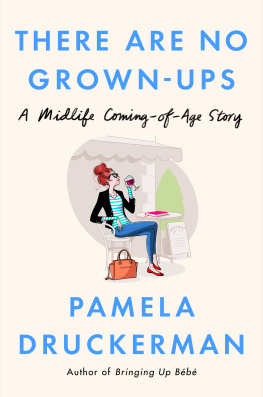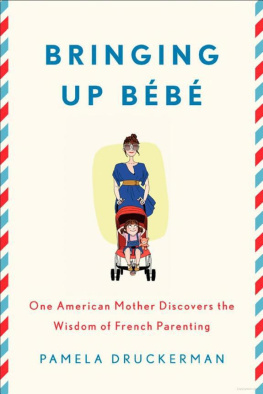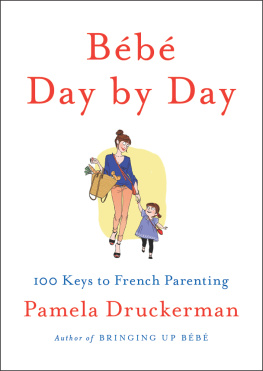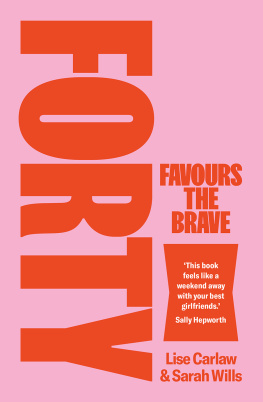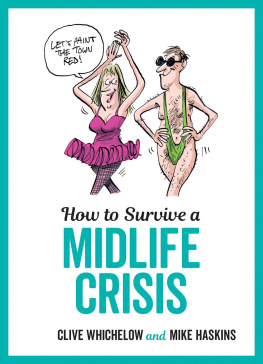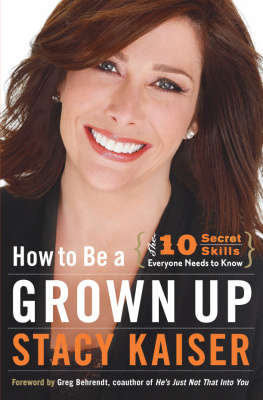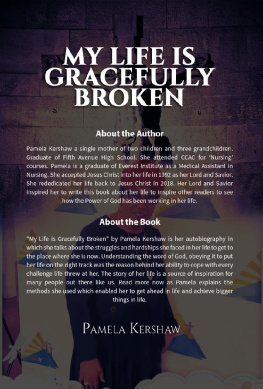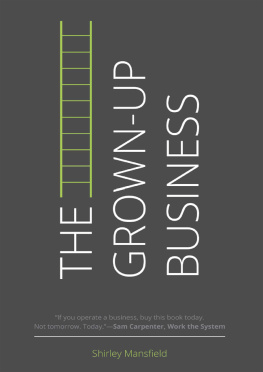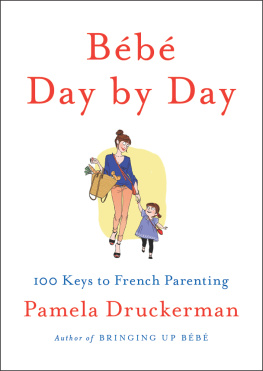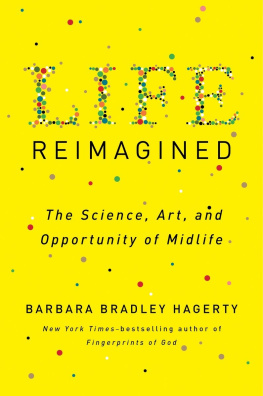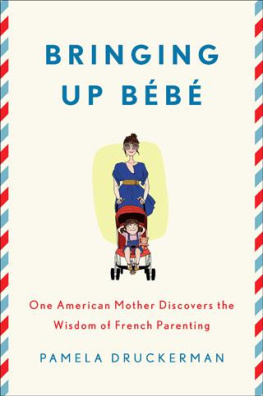ALSO BY PAMELA DRUCKERMAN
Lust in Translation
Bringing Up Bb
Bb Day by Day
PENGUIN PRESS
An imprint of Penguin Random House LLC
375 Hudson Street
New York, New York 10014
penguin.com
Copyright 2018 by Pamela Druckerman
Penguin supports copyright. Copyright fuels creativity, encourages diverse voices, promotes free speech, and creates a vibrant culture. Thank you for buying an authorized edition of this book and for complying with copyright laws by not reproducing, scanning, or distributing any part of it in any form without permission. You are supporting writers and allowing Penguin to continue to publish books for every reader.
Portions of this book first appeared in the New York Times under the titles What You Learn in Your 40s, How to Find Your Place in the World After Graduation, How to Talk to Children About Terrorism, and In Paris, a Night Disrupted by Terror; and in Marie Claire under the title How I Planned a Mnage Trois.
ISBN 9781594206375 (hardcover)
ISBN 9780698186811 (ebook)
Some names and identifying details have been changed to protect the privacy of the people involved. In some instances, the chronology of events has been changed.
Version_1
For Simon, Leila, Joey and Leo
contents
Forty is a fearsome age.
Its the age when we become who we are.
C HARLES P GUY
INTRODUCTION
bonjour, madame
IF YOU WANT TO KNOW how old you look, just walk into a French caf. Its like a public referendum on your face.
When I moved to Paris in my early thirties, waiters called me mademoiselle. It was Bonjour, mademoiselle when I walked into a caf and Voil, mademoiselle as they set down a coffee in front of me. I sat in many different cafs in those early yearsI didnt have an office, so I spent my days writing in themand everywhere I was mademoiselle. (The word technically means unmarried woman, but its come to signify young lady.)
Around the time I turn forty, however, theres a collective code switch. Waiters start calling me madame, though with exaggerated formality or a jokey wink. Its as if madame is a game were playing. They still sprinkle in the occasional mademoiselle.
Soon even these jocular mademoiselles cease, and my madames are no longer tentative or ironic. Its as if the waiters of Paris (theyre mostly men) have decided en masse that Ive exited the liminal zone between young and middle-aged.
On one hand, Im intrigued by this transition. Do the waiters gather after work for Sancerre and a slideshow to decide which female customers to downgrade? (Irritatingly, men are monsieur forever.)
Im aware of the conventions of aging, of course. Ive watched as small crinkles and creases appeared on the faces of my peers. Already, in my forties, I can see the outline of what some people I know will look like at seventy.
I just didnt expect madame to happen to me, or at least not without my consent. Though Id never been beautiful, in my twenties Id discovered my superpower: I looked young. I still had the skin of a teenager. People honestly couldnt tell whether I was sixteen or twenty-six. I was once standing alone on a New York subway platform when an older man stopped and said, sweetly, Youve still got your baby face.
I knew what he meant, and I was determined to preserve this small advantage. Long before any of my peers fretted about wrinkles, I used sunblock and eye cream each morning, and rubbed on more potions before bed. I didnt waste a smile on something that wasnt truly funny.
All this effort paid off. Into my thirties, strangers still routinely assumed I was a college student, and bartenders asked to see my identification. My compliment agethe age people say you look, to which you must add six or seven yearshovered safely around twenty-six.
In my forties, I expect to finally reap the average-looking girls revenge. Ive entered the stage of life where you dont need to be beautiful; simply by being well preserved and not obese, I would now pass for pretty.
For a while, this strategy seems to work. Fields of micro-wrinkles appear on the faces of women whod always been far better-looking than me. If I havent seen someone in a few years, I brace myself before meeting her, lest I accidentally gawk at how much shes changed. (The French call this tendency to look the same for a long stretch, then to suddenly look much older, a coup de vieux, an age blow.)
I regard the graying roots and creased foreheads of many of my peers with sad detachment. I am proof of the adage that everyone eventually gets the face she deserves. And what I deserve is, obviously, a permanently youthful glow.
But in the course of what seems like a few months, something changes in me, too.
Strangers no longer gush about how young I look, or seem shocked when I reveal that I have three children. People I havent seen in a while clock my face for a few extra beats. When I arrive to meet a younger friend at a caf, he stares right past me at first; he doesnt realize that the middle-aged lady standing in front of him is me.
Not everyone my age is distressed by these changes, but many seem to be suffering from a kind of midlife shock. One friend says that when she walks into a party, theres no longer a Cinderella moment when everyone turns to look at her. Ive noticed that men only appraise me on the streets of Paris now if Im in full hair and makeup. And even then, I detect a disturbing new message in their gazes: I would sleep with her, but only if doing so required no effort whatsoever.
Soon the madames are coming at me like a hailstorm. Its Bonjour, madame when I walk into a caf, Merci, madame when I pay my bill, and Au revoir, madame as I leave. Sometimes several waiters shout this at once.
The worst part is that theyre not trying to insult me. Here in France, where Ive lived for a dozen years as an expatriate, madame is a routine form of politeness. I call other women madame all the time, and teach my kids to say it to the elderly Portuguese lady who looks after our building.
In other words, Im now considered to be so safely into madame territory, people assume the title cant possibly wound me. I realize that something has permanently shifted when I walk past a woman whos begging for money on a sidewalk near my house.
Bonjour, mademoiselle, she calls out to the young woman in a miniskirt a few steps ahead of me.
Bonjour, madame, she says when I pass in front of her a second later.
This has all happened too quickly for me to digest. I still have most of the clothes that I wore as a mademoiselle. There are mademoiselle-era cans of food in my pantry. Even the math seems fuzzy: How is it that, in the course of a few years, everyone else has become a decade younger than me?
What are the forties? Its been my custom not to grasp a decades main point until its over, and Ive squandered it. I spent my twenties scrambling in vain to find a husband, when I should have been building my career as a journalist and visiting dangerous places before I had kids. As a result, in my early thirties I was promptly fired from my job at a newspaper. That freed me up to spend the rest of my thirties ruminating on grievances and lost time.
This time, Im determined to figure out the decade while Im still in it. But while each new birthday brings some vertigoyoure always the oldest youve ever beenthe modern forties are especially disorienting. Theyre a decade without a narrative. Theyre not just a new number; they feel like a new atmospheric zone. When I tell a forty-two-year-old entrepreneur that Im researching the forties, his eyes widen. Hes successful and articulate, but his age leaves him speechless.

